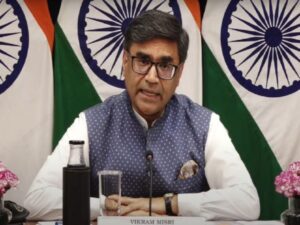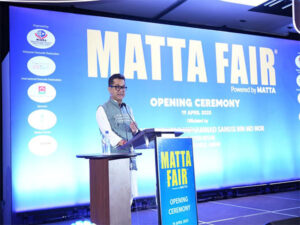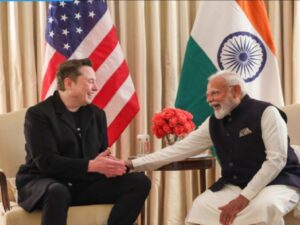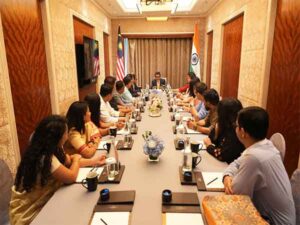G20: Think20 begins in Mysuru with digital public infrastructure and environmental protection among eight focus areas
Mysuru (Karnataka) [India], August 1 (ANI): The Think20 (T20) Summit began in Mysuru on Monday with a plenary panel that brought together members of the T20 India Core Group and its International Advisory Board. The T20 is an official engagement group of the G20 and serves as an “ideas bank” for the G20 by bringing together think tanks and high-level experts to deliberate on relevant policy issues.
Observer Research Foundation (ORF) is serving as the T20 Secretariat during India’s Presidency of the G20. Samir Saran, Chair, T20 India Secretariat and President, ORF opened the proceedings by drawing attention to the highlights of the T20’s interventions over the last eight months of the Indian G20 Presidency.
The T20, Saran said, has produced over 300 policy briefs and other research products by 1,000 authors from over 700 institutions worldwide, 45 per cent of whom are women. As part of its outreach and stakeholder engagement, 64 convenings have been held across 16 Indian cities and six abroad. During the remaining four months of the Presidency, further high-level events are likely to be held in New Delhi, New York, Dubai, Cape Town, and Rio de Janeiro.
Ambassador Sujan Chinoy, Chair, Think20 Core Group of India’s G20 Presidency and Director General, Manohar Parrikar Institute for Defence Studies and Analyses, underscored eight issues that have emerged as key focus areas of the T20’s deliberations.
First, macroeconomic stability as a precondition for economic growth; Second, the recognition of the population-scale digital transformations brought about by “India’s digital public infrastructure (DPI) and India Stack”; third, a focus on environmental protection and solutions for responsible consumption – particularly the LiFE (lifestyle for environment) movement; fourth, the importance of climate governance, with a central focus on “the energy security, sustainability and access of developing countries”; fifth, the critical need for women-led development and gender equality
; sixth, a need to reimagine the global financial architecture and fiscal landscape; seventh, a consensus that multilateral reform is imperative; and eighth, a recognition that the G20 should engage with underrepresented regions, and seek to work towards the inclusion of the African Union as a member of the G20.
There have been marked continuities between the Indonesian and Indian Presidencies, pointed out Bambang Brodjonegoro, Professor, Faculty of Economics, University of Indonesia. He observed that the similarity of the priorities identified by both countries’ T20 Communiques stemmed from the fact that both were emerging economies with broadly similar development concerns; and that India had been closely involved with and supportive of the Indonesian Presidency.
Ahead of the inception of the Brazilian G20 Presidency of 2024, Luciano Serva, President, of the Institute of Applied Economic Research, Brazil felt that a common strand running through the present G20 troika was a focus on promoting inclusive growth and advancing efforts to meet the Sustainable Development Goals (SDGs). She also felt that pushing for multilateral reforms was likely to be a core element of the Brazilian G20 agenda, and noted that closer dialogue was required between the G20 and the T20.
Elizabeth Sidiropoulos, Chief Executive, South African Institute of International Affairs, South Africa lauded the Indian and Indonesian Presidencies for foregrounding the development country agenda. She went on to observe that a more just and fair global debt and taxation system needed to be evolved; and that every effort would have to be made to recover the gains made before the pandemic, which had since been lost, causing the development and growth status of most nations to regress.
The panellists agreed that there was a stronger need than ever before for countries to work collaboratively; to further mainstream think tanks into policy planning processes; to build mechanisms to enable stronger convergences between the G20 and the T20; and to devise creative forms of engagement between think tanks, governments and intergovernmental organizations.
The plenary panel was followed by the launch of the T20 Communique, a key outcome document that synthesizes insights from the T20 Taskforce Statements, policy briefs, and the Ideas Box – a novel platform introduced by Think20 India to engage citizens and allow them to share their perspectives.
The inaugural evening of the T20 Summit concluded with a special address by Amitabh Kant, India’s G20 Sherpa. The Sherpa complimented the T20 for its contribution as a global ideas bank. He reiterated Prime Minster Modi’s message that the Indian Presidency had sought to be ambitious, action-oriented, and decisive, coming as it did at a time of global slowdowns, debt crises, and geopolitical turbulence. Each of the Presidency’s major outcome documents – including the T20 Communique – he noted, had thus attempted to define a clear roadmap for action.
Drawing attention to the IMF’s projection that 80 per cent of the world’s near-future growth would come from emerging markets and developing countries, the Sherpa noted that the G20 troika plus one made for a historic moment when four developing countries in succession could set and steer a global agenda, rather than simply responding to an agenda set by others. “For the first time ever, there is a real chance to ensure a greater flow of resources to support the SDGs and climate action,” he said. Given that changes in emerging nations could lift millions out of poverty, it was critical to initiate the process of reforming the global financial architecture and stabilizing lending rates.
The Sherpa pointed out that the transformational impacts of technology were a defining feature of the present. India’s DPIs – which are open-source, use open APIs and are interoperable – have helped provide direct cash transfers and social protection to millions. Big tech platforms have tended to compromise personal data, but DPIs’ public interest layers support a more responsible form of public and private innovation, which has also allowed for “quantum digital pole-vaulting” by countries that have created them.
The Sherpa also asserted that an annual flow of financial resources worth around USD 7 trillion was required to catalyse efforts to achieve the SDGs. He dismissed the notion that resources were scarce, arguing that around USD 350 trillion could actually be made available if the private sector were to step in and a more market-based approach to development adopted. As part of this approach, high carbon-emitting companies also needed to be actively penalized. In this context, India – the Sherpa felt – should “take the lead in industrializing without carbonizing”.
Finally, concluded the Sherpa, women-led development was another area where India could demonstrate its leadership. As he said, “The World Economic Forum has estimated that it will take 131 years to achieve gender parity. But we have to do it in a decade. India has therefore pushed hard for this at the G20,” with positive outcomes.
Over 200 participants from 35 countries and nearly 110 institutions are being hosted at the T20 Summit. The delegates include ministers, diplomats, policy planners, heads of think tanks and research institutions, civil society organisations, and eminent thinkers whose collective agency will ensure rich and diverse discussions at the Summit.






